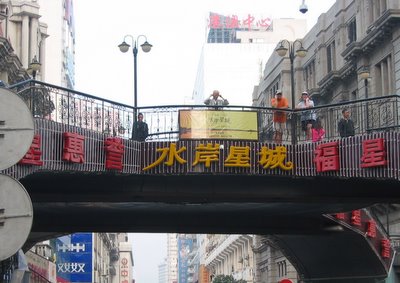Wuhan Walking

They heard the sonnet. This was something few American students could do, at least in my experience... The Chinese had spent years deliberately and diligently destroying every valuable aspect of their traditional culture, and yet with regard to enjoying poetry Americans had arguably done a much better job of finishing ours off. How many Americans could recite a poem or identify its rhythm?
—Peter Hessler, River Town: Two Years on the Yangtze
We get off the boat and head briskly left past the drivers hosing down their buses, instead of taking a right to the waterfront bonsai market. The wide thoroughfare is no good for walking and the banks and other institutional buildings are no good for sightseeing, so we bear east toward a promising clock tower. From there, a broad, stone-paved street radiates south through the heart of the city, and we take it.
It's Sunday morning, but people are out in force. The stylish shops are opening, gates half rolled up, lights coming on inside. Music plays loudly from tinny boombox speakers as groups of women dance in unison or perform tai chi with fans or swords. Sleepy teens fish their breakfast from cartons before starting work. Pedestrians have to themselves the full width of the street, which could have been in Amsterdam or Sienna.
A graceful wrought iron stairway crosses a busy intersection. At the top, a thin old man in a grey suit stares trance-like as he repeatedly rubs his palms from forehead crown. Presses into his cheekbones, working tiny circles just where the curve falls off under the eye sockets, then moves to the bridge of his nose. Pinches earlobes between thumb and forefinger and works them for awhile before massaging the rest of his ears, and then burrowing in. It's like watching a man take a bath and tiger pacing a cage all in one.
To my western eyes, he seems shell shocked, perhaps a victim of the Cultural Revolution, publicly going through an obsessive routine. But I am repeating some of his moves now as I recall the scene, and it seems possible he may have been meditating and practicing self-massage as part of his morning ritual.
Twice, we step over pavement where an elderly person is painting calligraphy in water with a long, mop-like brush, one character per stone. Later we learned these were classical poems, and the act a form of mental and physical exercise.
The shopping street eventually returns to moving traffic, so we turn up a narrower side street, lined with the typical owner-occupied shops. Why is there a line waiting for won ton at this shop, when so many others nearby offer quicker fare. The men sitting there on the sidewalk all have small hand saws. Not some with hammers, others with paint brushes. Are they waiting for work?
I stop in a school supply store, looking for funky Chinese pencils. A girl about 10 follows me, demonstrating products as I move along the shelves. She carefully clicks a dozen binary switches to show me how they lock a pink diary. I have to buy something, so I pick up a journal that is more subdued than the Hello Kitty inventory.
On the way back, I see gathering knots young people in orange t-shirts and sashes that look vaguely political. Off to the side, two older men also wearing orange shirts confer. They have whistles around their necks like referees. One young man with spiky hair hands cards to selected passersby. (I am not selected, though, I realize, I am wearing an orange t-shirt.) The man in the grey suit is gone. The poems have evaporated.
Back near the boat, some vendors are laying out their wares on blankets at the entrance to the bonsai market. I have 20 minutes before departure, so I decide to make a quick foray. There's a lot of the usual junk, but then a reddish chop with a beast carved in the top catches my eye. It has a nice heft and appears to be an original. I make an offer, which causes the woman seller to snort and bug her eyes out. Since the boat will soon leave, I don't have to pretend. I start to walk away.
Okay, okay, she says, and as she wraps it, she thrusts another chop toward me. I laugh and make a gesture of refusal. I'd looked at this one, but have the one I want. She writes down her price. I strike it out and offer one-third as I walk away. Okay, okay. She presses small carved cube in my hand. No, no, I am laughing. I have to go. She hands me the paper and pen. I write down a ridiculous price, about $2.50. She doesn't even counter. Okay, okay.
Later, the boat's resident culture expert says inscritpions indicate the second chop has used by a general in Beijing some 80 years ago, and the first, about the same age, may have been used for an intellectual's books and writings. The actual characters on the chops are too old for him to read.
But by now it doesn't matter. This is the day I will remember, long after my words evaporate.




0 Comments:
Post a Comment
<< Home